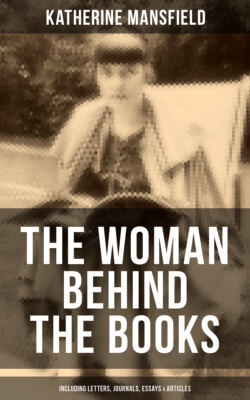Читать книгу Katherine Mansfield, The Woman Behind The Books (Including Letters, Journals, Essays & Articles) - Katherine Mansfield - Страница 44
На сайте Литреса книга снята с продажи.
1
ОглавлениеWHEN they arrived in England, after a month spent in visiting various relations, the Beauchamp girls entered Queen’s College in Harley Street in April, 1903. It was the natural place for them. Cousins of theirs were at the College. Probably it was regarded by Miss Swainson as the ideal of all that a “ladies’ college” at home should be. Certainly it represented the first great effort of Victorian England to meet with due decorum the new demand for the adequate education of women. It had been advanced; but advanced within the bounds of the Victorian tradition, to which the Beauchamp family adhered — the more loyally because they had to cling to it across a hemisphere.
The College had been founded in 1848. It owed its existence in part to the Governesses’ Benevolent Institution, and in part to the exertions of Frederick Denison Maurice, that pioneer of education. In the’forties it was advanced indeed; but now, in 1903, by remaining faithful to itself, it had become a conservative academy, in need of drastic reorganisation, which was to overtake it some years after- wards. But when the Beauchamp girls entered it, the heads — the old Principal, and the Lady Resident, Miss Croudace — were elderly, and the methods a survival from a past generation.
It had about forty boarders,”Compounders” they called themselves. They lived under the care of Miss Clara Phenessa Wood, in an old Harley Street house, No. 41, adjoining the College at No. 45. Long stone stairs and dark cold passages led to odd cubicle bedrooms tucked away in every available corner. From the top of No. 41 a narrow dark passage where the boots were kept, connected the boarding-house with No. 45, where the overflow boarders were accommodated in the top floor of the College Hall.
Miss Wood had undoubtedly been efficient in her day — but now, in the transition period, she clung to the traditions of the past — the traditions of her mid-Victorian prime, and to the girls, restless at the beginning of a new generation, her ways seemed stern beyond measure. Feeling this restlessness, yet not understanding its cause,”Woodie” was, perhaps even stricter than she had been twenty years previously; in addition, she was severely handicapped by impediments of advancing age.
There were two assistants besides the four maids : little “Robin,” Miss Robinson, rather like a spry bird. When, finally, she married one of the men who brought things to the back door, and thus escaped, the girls were glad for her; though her marriage turned out to be unlucky. When “Robin” left, Bell Dyer, the Beauchamp girls’ young aunt, took her place to help Miss Wood in the Hall. Bell Dyer was thought beautiful by those who knew her; and she had ways, such as tucking a scarlet rose into her lovely red hair, which seemed exotic to the girls. Her hair was memorable :”it was the colour of fresh fallen leaves, brown and red with a glint of yellow.” But in New Zealand this beauty had gone unappreciated. Bell had no chance for wide acquaintance there — in particular, no opportunity to meet eligible men. As Kathleen looked back, she felt sorry for Bell Dyer. When ships had come into Wellington harbour, and there were officers to dinner she remembered how Bell stood where the lamp threw a light on her beautiful hair. She was stationed in the Beauchamp home for a while, helping grandmother Dyer; then she trained to be a nurse, but the threat of tuberculosis made nursing impossible. Now here she was in London as a sort of chaperon for the three girls; yet she had her own life to consider.
The second assistant to “Woodie” was “Hatchet,” old unlucky Miss Hatch, an inoffensive person who crept about her own unimportant business, but very much in the girls’ way for no fault of her own: her cubicle was one end of the only bath-room. It was partitioned off with half the bath-room window in Miss Hatch’s room; and the girls were continually having to run up to see if “Hatchet” was in when they wanted to bathe. Not that she would be likely to spy out of her half window; yet they somehow felt happier if they knew she was not there — though they didn’t mind if she was in when they practised — the piano being in the bath-room, too.
The four maids had so much work caring for forty girls and a big house that they were harried and abrupt. One, a grim person responsible for washing the girls’ hair, was notorious for leaving it soapy and stiff. It was a time when girls were still proud of their long, lovely hair, and it was still the fashion to wear it in a soft veil falling over the shoulders.
Such was the personnel of the boarding-house. The only other person responsible for the welfare and happiness of the boarders, apart from the academic staff, was the Lady Resident, old Miss Croudace, who belonged to the same régime and the same period as Miss Wood. She was assisted by the porter, Alfred, who became, in retrospect, at least, a quaint and legendary figure.
